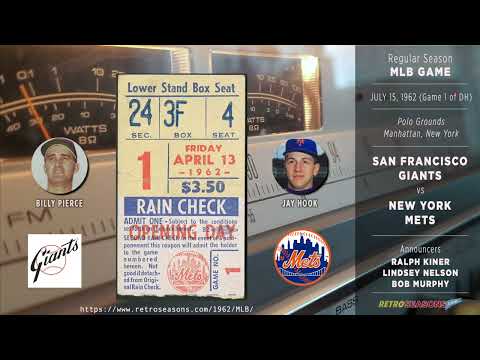In the 1962 season, both the New York Giants and the New York Mets experienced contrasting fortunes in Major League Baseball. The Giants, led by manager Alvin Dark, showcased a strong performance, finishing the regular season with a commendable record of 103 wins and 62 losses. They featured standout players such as Willie Mays and Orlando Cepeda, who contributed significantly to their success. However, despite their remarkable regular season, the Giants fell short in the World Series, losing to the American League champions, the New York Yankees, in a tightly contested seven-game series.
On the other hand, the newly formed New York Mets had a difficult inaugural season. Managed by Casey Stengel, the Mets struggled to find their footing, concluding the season with a disappointing record of 40 wins and 120 losses. Plagued by inconsistent performances and a lack of experienced players, the Mets faced significant challenges throughout the year. Despite the team's struggles, the 1962 season laid the groundwork for the Mets' future development and eventual rise to success in the years to come.
F i l t e r & S o r t Filter & Sort
3 hours
Sep 8, 1962Sep 8, 1962
On September 8, 1962, the Houston Colt .45s faced off against the New...
New York Mets vs Houston Colt .45s - Game 2 of DH - Radio Broadcast / On September 8, 1962, the Houston Colt .45s faced off against the New York Mets at Colt Stadium. The starting pitchers were Roger Craig for the Mets and Turk Farrell for the Colt .45s. At this point in the season, both teams were struggling, with the Mets in their inaugural season and the Colt .45s in their first year as well. The 1962 season was marked by the expansion of the league, with both the Mets and the Colt .45s being new additions. However, the Mets were infamous for their poor performance, finishing the season with a record of 40-120, the worst in modern MLB history. The Colt .45s, on the other hand, were faring slightly better, but still below .500.
The game began with a scoreless first inning, but the Colt .45s managed to score a run in the second inning, thanks to Bob Aspromonte's single and Bob Lillis's double. The Mets, however, came back strong in the third inning, scoring four runs on a walk by Elio Chacon and singles by Charlie Neal and Marv Throneberry. The Colt .45s responded with a run in the bottom of the third, narrowing the Mets' lead. The game then entered a period of relative quiet, with the Mets unable to score until the eighth inning and the Colt .45s adding a run in the sixth and seventh innings.
The back and forth continued into the eighth inning, with the Mets adding a run to their tally, but the Colt .45s responded with a run of their own, tying the game at 5-5. After a scoreless ninth inning, the game moved into extra innings. In the bottom of the tenth, the Colt .45s managed to score the winning run, ending the game with a 6-5 victory.
The game was a microcosm of the 1962 season for both teams. The Mets, despite showing flashes of potential, were unable to maintain their early lead, a pattern that was seen throughout their season. The Colt .45s, meanwhile, demonstrated their ability to fight back and secure a win, a trait that helped them finish the season with a more respectable record than the Mets. Despite the struggles of both teams, the 1962 season was a significant one for Major League Baseball, marking the beginning of expansion that would continue over the next few decades.
25 minutes
Apr 15, 1962
After weeks of Dorothy pointlessly asking mystery guests whether they studied dentistry, Casey Stengel finally...
What's My Line? with Casey Stengel / After weeks of Dorothy pointlessly asking mystery guests whether they studied dentistry, Casey Stengel finally appears. Panelists Arlene Francis, Tony Randall, Dorothy Kilgallen, Bennett Cerf
5 minutes
1962
Hosted by retired NFL star Kyle Rote, these 5-minute programs feature interviews with some of the top figures in sports
Tops-in-Sports interview with Don Zimmer / Hosted by retired NFL star Kyle Rote, these 5-minute programs feature interviews with some of the top figures in sports during 1962





